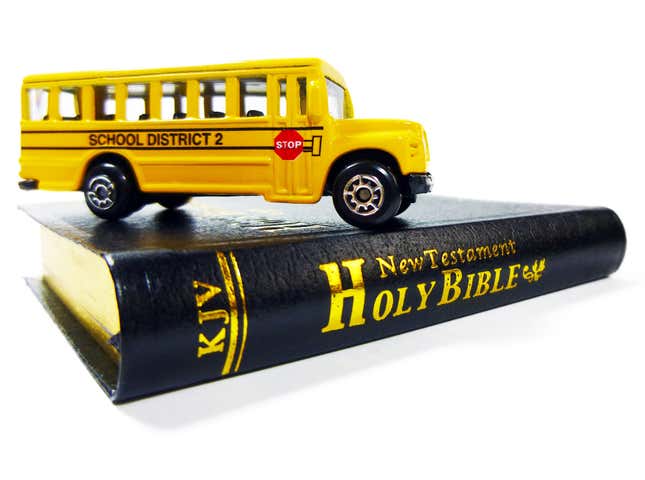
An increasing number of states across the U.S., buoyed by a January post by tweeter in chief Donald Trump, are adding Bible study to public school curricula in a move critics see as an attack on the separation of church and state as outlined in the Constitution.
As the Washington Post reports:
Activists on the religious right, through their legislative effort Project Blitz, drafted a law that encourages Bible classes in public schools and persuaded at least 10 state legislatures to introduce versions of it this year. Georgia and Arkansas recently passed bills that are awaiting their governors’ signatures.
The idea of adding the study of the Bible to public school coursework is not new; as CNN reports, the idea has “ebbed and flowed” for at least the last 20 years.
But in 2016, Republicans added support for “Bible literacy” in public schools to their party platform, and this year, Trump added fuel to that fire in a tweet he posted in January:
Supporters of Bible literacy in the schools argue that the impact of the Bible on U.S. and world societies cannot be denied and deserves to be studied.
Chuck Stetson, who publishes a Bible study textbook used in more than 600 public schools around the country, cites Trump’s support for the curricula.
“We’re not too far away from a tipping point. Instead of having to find a reason to teach the Bible in public schools academically, as part of a good education, you’re going to have to find a reason not to do it,” Stetson told the Washington Post. “When the president of the United States gives us a shoutout, that’s pretty crazy. ... It’s got the momentum now.”
But critics say too often such coursework becomes less about looking at the Bible from a strictly academic point of view and more about proselytizing about Christianity or even, specifically, Protestantism over other Christian sects.
As Heather Weaver, an attorney with the American Civil Liberties Union told CNN:
“Although they are often dressed up in neutral terms and they say these courses are not allowed to promote religion, these schools know that when it comes to implementing these courses, students are subjected to religious proselytizing and minority students are subjected to feeling excluded when these courses are offered.”

